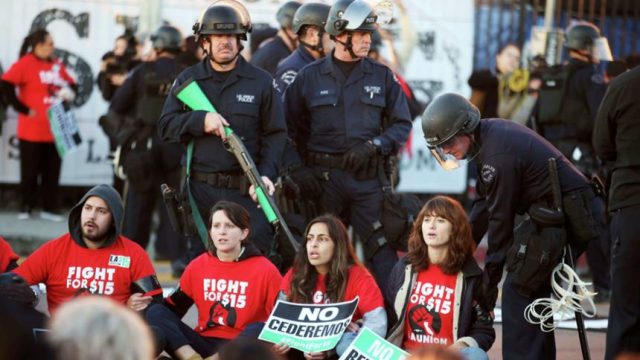What if Raising the Minimum Wage Is Bad for People Who Make the Minimum Wage?

Police prepare to arrest protesters calling for a minimum wage of $15 an hour during a demonstration in Los Angeles, California, U.S. November 29, 2016. REUTERS/Lucy Nicholson
Our friends on the left take it as an article of faith that raising the minimum wage is good for low wage workers. In fact, they argue it’s a good thing for all workers. “A rising tide lifts all boats,” is a saying they’re fond of invoking in defense of minimum wage hikes.
Earlier this year Rep. Marvin Nelson (D-Rolla) proposed legislation to raise North Dakota’s minimum to $9.25 an hour and implement automatic increases in the future tied to the rate of inflation.
“There’s really very little in the way of negative effects,” he said of his policy during an interview with me.
But that doesn’t seem to be the experience of low wage workers in Seattle. The minimum employers are allowed to pay employees has gone up significantly there, but the result for low-wage workers has been less employment and less income according to research from the University of Washington:
In January 2016, Seattle’s minimum wage jumped from $11 an hour to $13 for large employers, the second big increase in less than a year. New research released Monday by a team of economists at the University of Washington suggests the wage hike may have come at a significant cost: The increase led to steep declines in employment for low-wage workers, and a drop in hours for those who kept their jobs. Crucially, the negative impact of lost jobs and hours more than offset the benefits of higher wages — on average, low-wage workers earned $125 per month less because of the higher wage, a small but significant decline.
Why is this happening?
It’s useful to think of the minimum wage as a sort of tax on low-wage labor. If employers are forced to increase pay for unskilled labor without getting any additional value out of that labor they’re going to react in rational ways.
They’re going to reduce or consolidate payroll. They’re going to cut hours for low-wage workers, and perhaps transfer those duties onto fewer workers who earn higher wages because they have a greater degree of skill and competency.
Proponents of the minimum wage want us to believe that we can increase payroll costs in a static environment. They want us to believe that employers won’t react to the changes. But employers do react, and unfortunately not in ways that are beneficial for the low-wage workers minimum wage policy is supposed to help.




